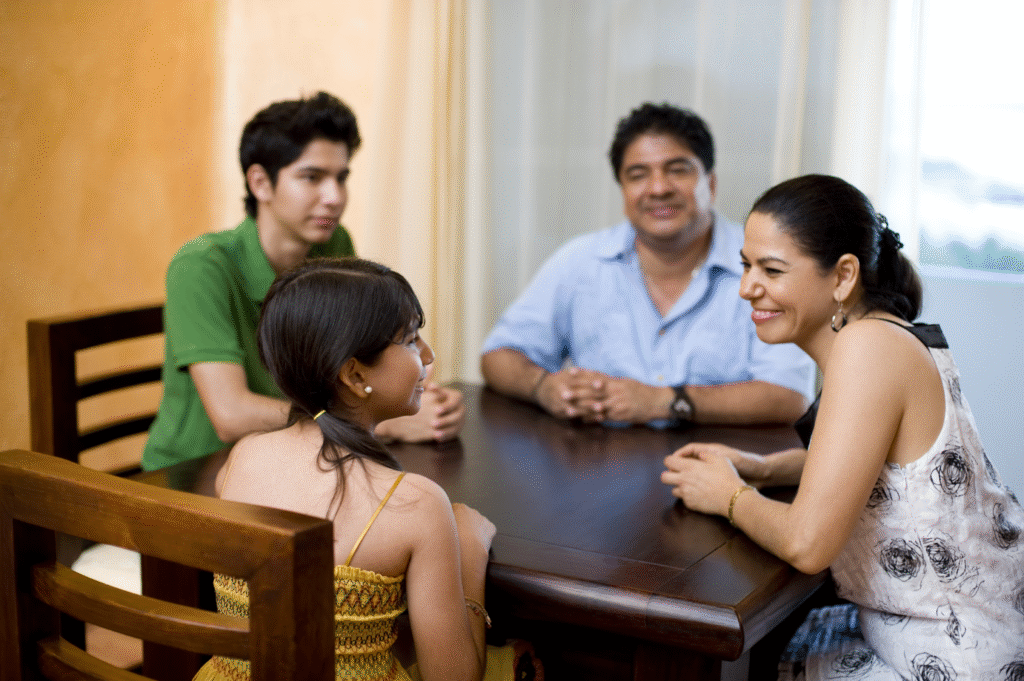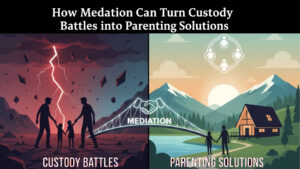Divorce is tough on parents, but it’s even harder on children caught in the middle.
When conflict becomes the focus, children often feel confused, anxious, and uncertain about their future. They may not understand why communication between their parents has changed or why family routines no longer feel stable. The emotional strain of arguments or prolonged tension can affect their confidence, relationships, and sense of security.
Mediation offers a calmer path that protects children from this stress. Instead of turning decisions into courtroom battles, parents work together with the guidance of a neutral mediator. This process encourages cooperation and communication, helping families focus on solutions that support their children’s emotional and practical needs. It allows parents to make thoughtful decisions about custody, routines, and parenting without exposing their children to unnecessary conflict.
Ready to take the first step toward a calmer, child-focused resolution? Schedule your consultation with San Diego Family Mediation Center today and begin creating a peaceful path forward for your family.
Let’s explore how family mediation can protect your children’s emotional well-being during divorce and help them adjust with greater comfort and stability.
The Impact of Divorce Conflict on Children
Conflict between parents during divorce affects children more deeply than many realize. When disagreements become frequent or intense, children often internalize the tension around them. They may begin to feel anxious, confused, or uncertain about their role in the family.
Some children withdraw emotionally, while others act out in response to stress they do not fully understand. Over time, this emotional strain can influence their confidence, academic focus, and relationships with both parents.
Research consistently shows that children experience less distress when parents manage separation with calm communication. Studies published by child psychology experts, including those in the American Psychological Association, highlight that it is not divorce itself that harms children most, but ongoing parental conflict.
When children witness arguments or sense hostility, they often feel responsible for the tension and fear losing connection with one or both parents.
Shielding children from this environment is essential. Keeping them away from court proceedings and heated disputes helps protect their emotional stability. Mediation supports this goal by creating a private and cooperative setting where parents can resolve issues without exposing their children to stress. This approach gives children what they need most during divorce: reassurance, consistency, and peace.
What Is Divorce Mediation?
Divorce mediation is a cooperative process that helps parents resolve important issues through guided discussion. It provides a structured environment where both people can express their needs, listen to each other, and work toward solutions that feel fair and practical. The goal is to create understanding rather than conflict, allowing parents to move forward with clarity and respect.
The mediator plays a neutral role, ensuring that both voices are heard and that conversations stay balanced. They help parents identify shared goals, clarify misunderstandings, and keep the focus on what truly matters for the family’s future. This supportive guidance helps parents communicate more effectively and make decisions that reflect their children’s best interests.
Mediation encourages cooperation instead of opposition. By working together, parents preserve stability for their children and reduce the emotional strain that often accompanies separation. The process promotes thoughtful decision making that strengthens family relationships even after the divorce is complete.
How Mediation Protects Children

Mediation protects children by reducing the emotional strain that often follows separation. When parents resolve disagreements through guided discussions rather than conflict, children are spared from witnessing tension and hostility. This calmer approach helps them feel secure and supported, even as their family structure changes. Research consistently shows that children adjust more positively when parents communicate respectfully and avoid exposing them to disputes (Source)
Emotional stability also grows when children see their parents cooperating. Calm communication between parents lowers a child’s sense of fear and uncertainty. It reassures them that, despite the changes, both parents remain committed to their well-being. Mediation creates this sense of safety by promoting patience and understanding throughout the process.
A key benefit of mediation is the creation of clear and balanced co-parenting plans. Mediators help parents build routines that are consistent, predictable, and considerate of the children’s daily needs. This structure provides comfort and reduces the confusion that often accompanies family transitions.
Mediation also improves long term communication between parents. By learning to resolve issues respectfully during sessions, parents are better prepared to handle future decisions together. This respectful pattern helps maintain a calm family environment, which directly supports children’s emotional health and sense of stability.
Mediation vs. Court Divorce
Choosing mediation instead of court can significantly change how a family experiences divorce. The two processes differ not only in cost and time but also in how they affect emotional well-being and the stability of children. The table below highlights key differences that show why mediation is often a healthier and more practical choice for families.
| Aspect | Mediation | Litigation |
|---|---|---|
| Environment | Private and peaceful, promoting calm discussions in a safe setting. | Public and stressful, often increasing tension and emotional strain. |
| Cost | Lower overall costs due to fewer sessions and shared expenses. | Higher costs from court fees, legal representation, and extended timelines. |
| Duration | Typically completed in a few structured sessions focused on resolution. | Often takes months or even years, prolonging uncertainty and conflict. |
| Impact on Children | Protective and calm, helping children feel secure and supported. | Emotionally draining, exposing children to ongoing disputes and instability. |
Mediation allows families to focus on rebuilding stability rather than prolonging conflict. By choosing a peaceful process, parents can protect their children’s emotional health while reaching fair and lasting agreements.
The Mediation Process at San Diego Family Mediation Center
At San Diego Family Mediation Center, every stage of the process is built to support communication, understanding, and emotional safety. Our goal is to help parents reach clear, lasting agreements while protecting their children from unnecessary stress. Each step has a defined purpose and moves families closer to resolution with respect and balance.
Step 1: Initial Consultation and Identifying Family Needs
The process begins with a private consultation where both parents meet with the mediator. During this meeting, the mediator listens carefully to understand the family’s situation, concerns, and priorities. Together, everyone identifies the main issues that need attention, such as finances, parenting schedules, or communication challenges. This first step builds trust and sets the tone for calm and productive sessions.
Step 2: Structured Sessions Guided by a Neutral Mediator
Mediation sessions are structured but flexible enough to meet each family’s needs. The mediator remains neutral and ensures both parents have equal time to share their views. They guide the discussion, keep the conversation focused, and help prevent emotional reactions from interrupting progress. The sessions emphasize collaboration so that each decision supports the family’s long term stability.
Step 3: Parenting Plan Creation Focused on Children’s Routines
Once communication improves, the mediator helps parents develop a parenting plan. This plan outlines schedules, responsibilities, and ways to handle daily routines. It also includes details about school activities, holidays, and transitions between homes. The goal is to create consistency that helps children feel safe and supported in both households.
Step 4: Agreement Finalization and Legal Completion
After the main issues are resolved, the mediator organizes the final agreement. Every term is written clearly so both parents understand what has been decided. If needed, the agreement can be submitted to the court for approval, making it legally binding. This step closes the process with peace of mind, knowing that the agreement reflects fairness and stability for everyone involved.
Our mediators ensure your children’s emotional safety every step of the way. They guide parents with patience, clarity, and care so that every discussion leads toward understanding, cooperation, and a positive future for the family.
Benefits for the Whole Family

Mediation benefits every member of the family by creating a smoother and more supportive path through separation. The process helps parents reach resolution more quickly, reducing the emotional strain that often comes with lengthy disputes. When parents communicate calmly and work together, the entire family begins to heal sooner and adjust with greater ease.
It also strengthens co-parenting relationships. Mediation encourages respectful communication and helps parents focus on shared goals rather than past disagreements. This cooperation makes it easier to coordinate decisions about school, schedules, and daily routines, giving children a consistent and peaceful environment.
The skills learned in mediation extend beyond the sessions. Parents develop healthier ways to communicate, which reduces future conflict and builds trust over time. For children, this stability provides reassurance and a strong sense of belonging. They see their parents working together, which reinforces security and emotional balance during a time of change.
Mediation supports not just agreement but understanding. It helps families rebuild respectful relationships and move forward with confidence, knowing that their choices protect both their present peace and their future well-being.
Frequently Asked Questions
Q1: How does mediation help children during divorce?
Mediation protects children by reducing their exposure to arguments and emotional stress. It helps parents communicate calmly and make decisions that prioritize the child’s well-being. Because mediation focuses on cooperation, children experience fewer disruptions and a greater sense of security during family changes.
Q2: Are children part of the mediation process?
Children usually do not attend mediation sessions. Parents work with the mediator to design parenting plans that reflect their children’s needs and daily routines. This approach protects children from involvement in adult discussions while ensuring their best interests remain at the center of every decision.
Q3: Is mediation suitable for high conflict situations?
Yes, mediation can still be effective when conflict levels are high. Trained mediators know how to manage tension and guide conversations so both parents can communicate safely. The structured setting helps reduce emotional reactions and allows discussions to stay focused on reaching workable solutions.
Q4: How long does the process take?
Mediation usually takes a few sessions, depending on how many issues need to be resolved. Families often reach agreements within weeks instead of months, which helps reduce stress and legal costs. The flexible pace allows time for thoughtful decisions while keeping progress steady.
Q5: Why choose San Diego Family Mediation Center?
San Diego Family Mediation Center provides compassionate and experienced mediators who focus on creating child centered solutions. Each session is structured to maintain calm communication and mutual respect. Their process helps parents build agreements that protect their children’s emotional stability and long term well-being.
Conclusion
Mediation provides families with a practical way to move forward while keeping stability and respect at the heart of every decision. It helps parents separate legal matters from emotional tension and create solutions that truly work for everyone involved. Most importantly, it gives children the reassurance that both parents are committed to their well-being and peace.
The process promotes lasting understanding instead of just temporary agreement. With the right guidance, families can rebuild trust and cooperation that continue long after the divorce is complete.
Protect your children’s peace of mind. Contact San Diego Family Mediation Center today to schedule a confidential consultation and take the first step toward a calmer future.




